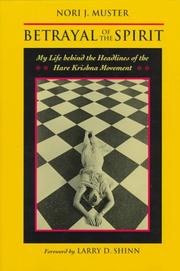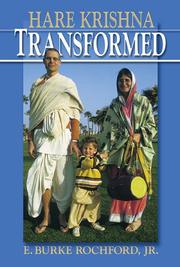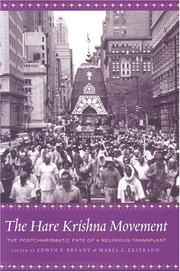| Listing 1 - 8 of 8 |
Sort by
|
Book
Year: 1985 Publisher: Brussel Studiekring Vrij Onderzoek
Abstract | Keywords | Export | Availability | Bookmark
 Loading...
Loading...Choose an application
- Reference Manager
- EndNote
- RefWorks (Direct export to RefWorks)
sekten --- geïnstitutionaliseerde godsdienst --- godsdienst --- mystiek --- mysterie-religie --- religie --- Jehovah's Getuigen --- Verenigingskerk --- Wereldwijde Kerk van God --- Stichting Internationale Gemeenschap voor Krishna-bewustzijn --- School voor Filosofie --- Bhagwan-beweging --- Scientology Kerk --- werkelijkheidszin --- psychische inductie --- sekten en politiek --- Meester Witteveen
Book
Year: 1985 Publisher: Brussel Studiekring Vrij Onderzoek
Abstract | Keywords | Export | Availability | Bookmark
 Loading...
Loading...Choose an application
- Reference Manager
- EndNote
- RefWorks (Direct export to RefWorks)
sekten --- geïnstitutionaliseerde godsdienst --- godsdienst --- mystiek --- mysterie-religie --- religie --- Jehovah's Getuigen --- Verenigingskerk --- Wereldwijde Kerk van God --- Stichting Internationale Gemeenschap voor Krishna-bewustzijn --- School voor Filosofie --- Bhagwan-beweging --- Scientology Kerk --- werkelijkheidszin --- psychische inductie --- sekten en politiek --- Meester Witteveen
Book
ISBN: 0664241700 Year: 1987 Publisher: Philadelphia Westminster Press
Abstract | Keywords | Export | Availability | Bookmark
 Loading...
Loading...Choose an application
- Reference Manager
- EndNote
- RefWorks (Direct export to RefWorks)
Hare Krishnas --- -Hindus --- International Society for Krishna Consciousness --- -I.S.K.C.O.N. --- ISKCON --- Hare Krishna Society --- International Society for Krsna Consciousness --- Mezhdunarodnoe obshchestvo soznanii︠a︡ Krishny --- Soznanie Krishny (Organization) --- ISKKON --- International Society of Krishna's Consciousness --- Hare Krishna Movement --- -International Society for Krishna Consciousness --- -Hare Krishnas --- -International Society for Krsna Consciousness --- Internationale gemeenschap voor Krishna-bewustzijn --- Hindus --- United States

ISBN: 0252094999 9780252094996 0252022637 9780252022630 0252065662 9780252065668 1306401585 Year: 1997 Publisher: Urbana
Abstract | Keywords | Export | Availability | Bookmark
 Loading...
Loading...Choose an application
- Reference Manager
- EndNote
- RefWorks (Direct export to RefWorks)
Hare Krishnas --- Hindus --- Biography. --- Muster, Nori J. --- International Society for Krishna Consciousness. --- International Society for Krsna Consciousness --- International Society for Krishna Consciousness --- Internationale gemeenschap voor Krishna-bewustzijn --- ISKCON --- the Krishna's International Society --- guru --- Jonestown --- spirituality --- drugs --- guns --- children --- P.R. Publications --- L.A. --- 1986 --- the ISKCON World Review --- women --- Ramesvara

ISBN: 0814776884 0814769071 1435607392 9781435607392 9780814775783 0814775780 9780814775790 0814775799 9780814769072 9780814776889 Year: 2007 Publisher: New York : New York University Press,
Abstract | Keywords | Export | Availability | Bookmark
 Loading...
Loading...Choose an application
- Reference Manager
- EndNote
- RefWorks (Direct export to RefWorks)
Most widely known for its adherents chanting “Hare Krishna” and distributing religious literature on the streets of American cities, the Hare Krishna movement was founded in New York City in 1965 by A. C. Bhaktivedanta Swami Prabhupada. Formally known as the International Society for Krishna Consciousness, or ISKCON, it is based on the Hindu Vedic scriptures and is a Western outgrowth of a popular yoga tradition which began in the 16th century. In its first generation ISKCON actively deterred marriage and the nuclear family, denigrated women, and viewed the raising of children as a distraction from devotees' spiritual responsibilities. Yet since the death of its founder in 1977, there has been a growing women’s rights movement and also a highly publicized child abuse scandal. Most strikingly, this movement has transformed into one that now embraces the nuclear family and is more accepting of both women and children, steps taken out of necessity to sustain itself as a religious movement into the next generation. At the same time, it is now struggling to contend with the consequences of its recent outreach into the India-born American Hindu community. Based on three decades of in-depth research and participant observation, Hare Krishna Transformed explores dramatic changes in this new religious movement over the course of two generations from its founding.
Hindu converts --- Hinduism --- Families --- Converts --- Hindus --- Religions --- Brahmanism --- Family --- Family life --- Family relationships --- Family structure --- Relationships, Family --- Structure, Family --- Social institutions --- Birth order --- Domestic relations --- Home --- Households --- Kinship --- Marriage --- Matriarchy --- Parenthood --- Patriarchy --- Religious aspects --- International Society for Krishna Consciousness. --- Social aspects --- Social conditions --- Krishna --- Christna --- Gopal --- Kr̥ṣṇa --- Govinda --- Mohan --- Gopala --- Bal Gopal --- Cult --- International Society for Krishna Consciousness --- International Society for Krsna Consciousness --- Internationale gemeenschap voor Krishna-bewustzijn --- History. --- Krishna (Hindu deity) --- Based. --- Hare. --- Krishna. --- Transformed. --- changes. --- course. --- decades. --- dramatic. --- explores. --- founding. --- from. --- generations. --- in-depth. --- movement. --- observation. --- over. --- participant. --- religious. --- research. --- this. --- three. --- Hare krishna --- America --- gender --- family --- culture --- change --- child abuse --- public schooling --- identity --- Hinduization --- world accomodation
Book
ISBN: 069100031X 0691600880 1400859891 9780691000312 9780691031354 0691031355 Year: 1989 Publisher: Princeton, N.J. Princeton University Press
Abstract | Keywords | Export | Availability | Bookmark
 Loading...
Loading...Choose an application
- Reference Manager
- EndNote
- RefWorks (Direct export to RefWorks)
Most Americans know about the "Hare Krishnas" only from encounters in airports or from tales of their activities in the East Village and Haight-Ashbury in the 1960s. This entertaining and sensitive book deepens our knowledge by tracing the paths of those Western Hare Krishnas who eventually traveled to or lived in India. The charismatic leader of the sect, the Indian monk Swami Bhaktivedanta, aimed to save Westerners from what he saw as materialism and atheism by converting them to worship of the Hindu god Krishna. In addition, he hoped that Western disciples would inspire Indians to rediscover their own religious heritage. Charles Brooks describes in full detail the work of the "reverse missionaries" in the town of Vrindaban--which, since it is traditionally considered to be identical with Krishna's spiritual world, is one of the holiest places in India and the site of some of its most engaging rituals.Have the Western Hare Krishnas really become part of Indian culture? Can it be that Indians accept these foreigners as essentially Hindu and even Brahman? Brooks answers in a way that radically challenges our accepted images of Indian social dynamics. Analyzing the remarkable success of the International Society for Krishna Consciousness and their temple complex in Vrindaban (where Bhaktivedanta was buried in 1977), Brooks describes the intricate social, economic, and religious relationships between Westerners and Indians. He demonstrates that social rank in the town is based not only on caste but also on religious competence: many Indians of Vrindaban believe, in Bhaktivedanta's words, that "Krishna is for all."Originally published in 1989.The Princeton Legacy Library uses the latest print-on-demand technology to again make available previously out-of-print books from the distinguished backlist of Princeton University Press. These editions preserve the original texts of these important books while presenting them in durable paperback and hardcover editions. The goal of the Princeton Legacy Library is to vastly increase access to the rich scholarly heritage found in the thousands of books published by Princeton University Press since its founding in 1905.
294.5*97 --- Hindoe-bewegingen in de 20ste eeuw: Aurobindo; Rabindranath Tagore; Ramana Maharshi; Swami Sivananda; J. Krishnamurti; Krishna conciousness --- 294.5*97 Hindoe-bewegingen in de 20ste eeuw: Aurobindo; Rabindranath Tagore; Ramana Maharshi; Swami Sivananda; J. Krishnamurti; Krishna conciousness --- International Society for Krishna Consciousness --- International Society for Krsna Consciousness --- Internationale gemeenschap voor Krishna-bewustzijn --- Vrindávan (India) --- Brindavan (India) --- Brindāban (India) --- Bindrāban (India) --- Bindrābund (India) --- Vrindavana (India) --- Vrindāban (India) --- Vr̥ndāvana (India) --- Religion. --- ISKCON --- Vrindavan (India) --- Religion --- International Society for Krishna Consciousness - India - Vrindávan. --- Vrindávan (India) - Religion. --- International Society for Krishna Consciousness -- India -- Vrindávan. --- Vrindāvan (India) -- Religion. --- Vrindaban --- pilgrimage --- cross-cultural dynamics --- Hare Krishnas --- India --- Loi Bazaar

ISBN: 023112256X Year: 2004 Publisher: New York : Columbia University Press,
Abstract | Keywords | Export | Availability | Bookmark
 Loading...
Loading...Choose an application
- Reference Manager
- EndNote
- RefWorks (Direct export to RefWorks)
Krishna (Hindu deity) --- Sects --- Krishna (Divinité hindoue) --- Sectes --- Cult --- History. --- Culte --- Histoire --- International Society for Krishna Consciousness --- 294.5*97 --- 294.5*97 Hindoe-bewegingen in de 20ste eeuw: Aurobindo; Rabindranath Tagore; Ramana Maharshi; Swami Sivananda; J. Krishnamurti; Krishna conciousness --- Hindoe-bewegingen in de 20ste eeuw: Aurobindo; Rabindranath Tagore; Ramana Maharshi; Swami Sivananda; J. Krishnamurti; Krishna conciousness --- ISKCON --- International Society for Krsna Consciousness --- Internationale gemeenschap voor Krishna-bewustzijn --- the Hare Krishna movement --- 1977 --- religious history --- beliefs and practices --- religious movement --- Krishna Consciousness --- modern spiritual movement --- Hindu theology --- Krishna --- Indic monotheism --- modern Chaitanya Vaishnavism --- Gaudiya Vaishnava practice --- Mleccha Desh --- ISKCON temple worship --- Bhaktivedanta Swami --- Shri Chaitanya Mahaprabhu --- charismatice renewal --- Gaudiya Vaishnavism --- the Gaudiya Math --- Bhaktivinoda --- scriptural literalism --- Mayavadins --- gender issues --- A.C. Bhaktivedanta Swami --- post-Bhaktivedanta controversies --- devotion --- ISKCON paradigm --- Narayana Maharaja --- doctrinal controversy --- the Jiva Debate --- child abuse --- Gurukula --- Hare Krishna Mahamantra
Book
ISSN: 15709434 ISBN: 9789004166134 9004166130 9786613060808 9047433262 1283060809 9789047433262 Year: 2008 Volume: 120. Publisher: Leiden: Brill,
Abstract | Keywords | Export | Availability | Bookmark
 Loading...
Loading...Choose an application
- Reference Manager
- EndNote
- RefWorks (Direct export to RefWorks)
The Hare Krishna movement is one of the most well-known new religious movements in the Western societies. It was founded in New York in 1966 by the Indian monk A. C. Bhaktivedanta Swami Prabhupāda (1896-1977). The fact that it emerged during the heyday of the countercultural protests is often invoked in the explanations of its success. This book offers a completely new account for the rise and growth of the Hare Krishna movement by analysing it from the viewpoint of cognitive science of religion. It focuses on the charisma of the founder-guru through the writings of his earliest disciples and also takes a close look at the theology and ritual practices of the movement.
A. C. Bhaktivedanta Swami Prabhupada, --- International Society for Krishna Consciousness. --- International Society for Krishna Consciousness --- 294.5*92 --- Vaisnavisme: Chaitanya; Bhagavata-purana --- A. C. Bhaktivedanta Swami Prabhup ̄ada, 1896-1977. --- A. C. Bhaktivedanta Swami Prabhupa ̄da, 1896-1977. --- Religion --- Philosophy & Religion --- Hinduism --- 294.5*92 Vaisnavisme: Chaitanya; Bhagavata-purana --- A. C. Bhaktivedanta Swami Prabhupāda, --- Swami, A. C. Bhaktivedanta, --- Prabhupāda, A. C. Bhaktivedanta Swami, --- Abhay Charan De, --- De, Abhay Charan, --- Bhaktivedanta Swami, A. C., --- Prabhupāda, --- A. Ch. Bkhaktivedanta Svami Prabkhupāda, --- A. Ca. Paktivētānta Svāmi Pirapupātā, --- Pirapupātā, A. Ca. Paktivētānta Svāmi, --- Paktivētānta Svāmi Pirapupātā, A. Ca., --- A. Ca. Paktivētānta Cuvāmi Pirapupātā, --- Paktivētānta Cuvāmi Pirapupātā, A. Ca., --- A. Ca. Paktivētāntacuvāmi Pirapupātā, --- Paktivētāntacuvāmi Pirapupātā, A. Ca., --- Bhaktivedanta, A. C. --- Bhaktivedanta, Abhay Charan, --- A. Ts'. Bhaḳtiṿedantah Sṿami Prabhupadah, --- א. צ'. בהקתיוגאנתה סואמי פרבהופאדה --- Abhaẏacaraṇa, --- International Society for Krsna Consciousness --- Internationale gemeenschap voor Krishna-bewustzijn --- ISKCON. --- A. C. Bhaktivedanta Swami Prabhupada, - 1896-1977
| Listing 1 - 8 of 8 |
Sort by
|

 Search
Search Feedback
Feedback About UniCat
About UniCat  Help
Help News
News